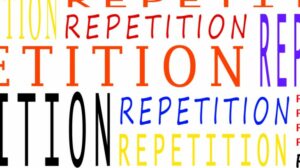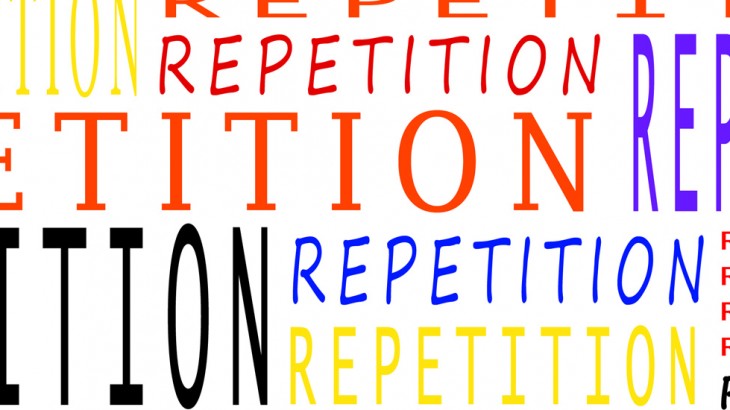
There are many advantages of repetition – whether it is committing a body of knowledge to memory or developing skills such as baseball or golf. In fact a highly touted book is termed the process “the 10,000 hour rule,” explaining that 10,000 hours of practice can make you an expert at almost anything. That’s how you can develop into a computer whiz or star basketball player.
But repetition can also develop you into an inflexible single-minded person who refuses to listen to reason or ignores any research that does not fit his or her belief system. So whether it’s politics, religion, or your relationship with money, repetition also has its disadvantages
Your brain likes to take the path of least resistance, so you should be careful what habits you allow it to develop. For instance, if you repetitively say “yes” to others’ requests because you don’t want to disappoint them or feel bad by saying “no,” you could eventually build a habit of saying “yes” without really thinking through the impact of doing so. This could disrupt your own schedule, delay an important project or even force you to abandon a personal activity.
Repetition of thought and/or action could be beneficial depending on its use. I can hardly see any disadvantage in memorizing people’s names or in strengthening a skill through repetition. But in other areas it might be wise to keep an open mind, follow research as well as reason, and be willing to change when the situation calls for it.
Sometimes referred to as” habits of the mind”, a person’s “executive skills” are those brain-based skills required to execute tasks – that is, getting organized, planning, initiating work, staying on task, controlling impulses, regulating emotions, and being adaptable and resilient. These skills primarily reside in the prefrontal cortex, that part of the brain that helps you manage complex problems, goals and self-control. We are all born with executive skills; but they take about twenty years to fully develop. The particular skill that you would probably need most in order to determine which activities would lend themselves to productive habits as opposed to harmful ones would be metacognition. It is one of twelve executive skills identified in the book, Work Your Strengths, by Richard Guare, Peg Dawson and Chuck Martin.
Metacognition is the ability to observe yourself in a situation and make changes so you’re better able to solve problems, build relationships and succeed in life. If you can see a situation objectively and evaluate how things are going, you are strong in this skill.
But if you don’t think through the possible results of your decisions, tend to make quick decisions, often repeat the same mistakes, and don’t think through long-term consequences, you are weak in this skill.
Metacognition is not an easy skill to develop because we have to step outside of ourselves — and our subjective thoughts, habits and biases — to look at each situation objectively. As David DiSalvo says in his book, Brain change, we have to “think about our thinking,” Although the prefrontal cortex is responsible for higher-order thinking and reasoning, multiple brain areas are involved in metacognition as well as in other executive skills.
We all have memories from the past – many unconscious ones — that influence how we think, feel, and react to different situations and behaviors. With a strong metacognition skill you are able to actively examine each situation on its own merit while resisting the impulse to react involuntarily. By doing so you can more easily adapt to change, make better decisions and become more creative and successful.
Since our brain is malleable, we can train ourselves to improve our metacognition; but it takes a conscious effort to reject unconscious and false beliefs and reasoning. The brain is more flexible than most people realize. Through practice you can strengthen any skill, and maintain conscious control of your thinking. You can’t stop thoughts and feelings from popping into your mind; but you can question their validity.
I choose to view the mind as a separate entity that can control the brain. The brain is a computer that will never be duplicated in its complexity and amazing functionality. But the mind is who you are, and the brain is at your disposal. But it doesn’t come with a user’s manual, except for the findings of the neuroscientists, and you must learn how to operate it yourself. And just as we can be controlled by technology instead of the other way around, we can be controlled by our brain if we don’t take charge.
You must do your own programming and updates. You must service your brain regularly with proper diet, exercise and mental challenges to keep it in good working order. Have a questioning attitude. Read. Continue with lifelong learning. Maintain an active social life. Never compromise on sleep. Manage stress. And question your own thinking so you don’t feed it faulty information. Remember the old GIGO acronym – garbage in, garbage out.
Keeping our brains sharp will make sure we neither become creatures of habit nor unduly influenced by others. We maintain our uniqueness.
Strengthening all twelve of our executive skills is discussed in my eBook, A brain’s eye view of time management: Strengthening your executive skills, published by Bookboon.com.


Recent Comments